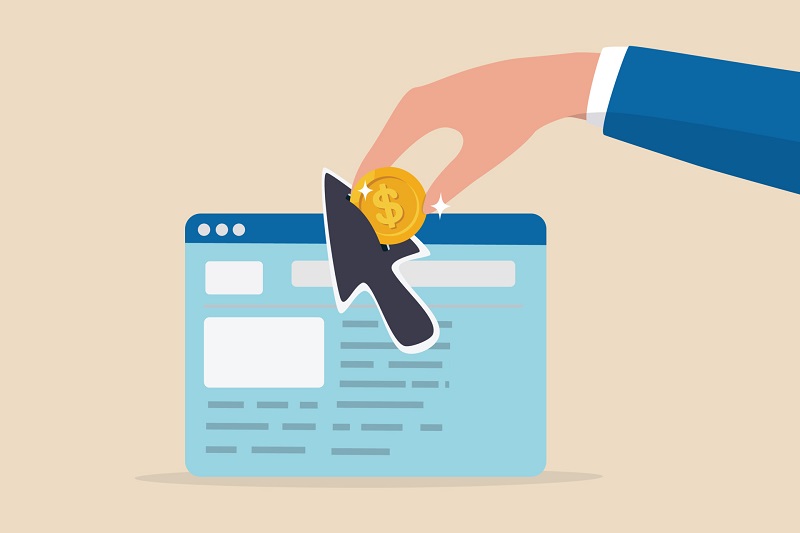In digital marketing, the Cost Per Click (CPC) is a crucial metric used in social media advertising and websites. Do you want to promote your products or services? Discover what CPC is and how to enhance its marketing power, just like with ChatGPT.

Understanding CPC in Digital Marketing
The Cost Per Click (CPC) in digital marketing is a pricing model used on social media platforms, such as LinkedIn Ads or Facebook Ads, and search engines like Google Ads. Every time a user clicks on your ad, you incur a charge.
Google Ads refers to this charge as a bid. When you create a Google Ads campaign, you select keywords you want to rank for in search results. Google then displays the most relevant sites based on these keywords when a user enters a query.
Next, you set your bid, or the maximum amount you are willing to pay for a click, based on these keywords. When a user searches, Google evaluates various criteria, like the maximum CPC and quality score, to display results.
If you set the maximum CPC yourself, it’s called manual bidding. Conversely, if you let Google automatically determine the amount, it’s known as automatic bidding.
Difference Between Average CPC and Maximum CPC
The average CPC differs from the maximum CPC concerning the average cost charged per click. To calculate it, divide the total cost of clicks by the total number of clicks:
Average CPC = Total cost of clicks / Total number of clicks.
However, clicks on search engine results are more expensive than those on website banners.
The maximum CPC is the highest amount you are willing to pay per click. You set this amount in your bid. In practice, the actual CPC is usually lower than the set bid amount. Note that the average CPC cannot exceed the maximum CPC, which is the highest bid.
Benefits of CPC
With CPC, you can estimate the budget needed for pay-per-click campaigns. This technique:
- Optimizes landing page effectiveness and tests their relevance.
- Generates traffic within your budget.
- Customizes advertising campaigns based on your goals.
Thus, you can implement the best conversion bid strategies.
Moreover, CPC helps generate traffic and plays a crucial role in achieving your objectives. You can choose between automated or manual bidding strategies, select the ad type and format that suits you, and better personalize and optimize your pay-per-click campaigns.
Optimizing Your CPC in Digital Marketing Campaigns
You might think those with the highest bids appear at the top of search results. Not true! To optimize your CPC, follow these best practices:
Select Appropriate Keywords
First, identify your keywords for a CPC campaign. Use a SEA tool to find keywords relevant to your niche.
Manage Bids Effectively
Effective bid management will help you succeed in your paid marketing campaign. Consider hiring an SEO consultant to choose the best-performing SEO keywords and competitive keywords. Your company can eliminate underperforming keywords and optimize the budget for your ad campaigns.
Optimize the Landing Page
Even if your website ranks high in search results, optimize the landing page to capture the user’s attention. The profitability of CPC starts when a visitor who clicks on the page converts into a customer.
Focus on visuals, calls to action, and contact information on the landing page to improve conversion rates.
These are just the basics, but you can delve deeper into the topic. This digital marketing training will teach you everything you need to know to promote your products and services effectively by implementing a robust digital strategy!
Frequently Asked Questions (FAQs)
1. What is CPC in digital marketing? CPC, or Cost Per Click, is a pricing model used in digital advertising where advertisers pay a fee each time a user clicks on their ad. It is commonly used on platforms like Google Ads and social media sites.
2. How does Google Ads determine which ads to display? Google Ads uses a combination of factors including keyword relevance, the maximum CPC bid, and the quality score of the ad to determine which ads to display in response to a user’s search query.
3. What is the difference between average CPC and maximum CPC? The average CPC is the total cost of all clicks divided by the number of clicks, whereas the maximum CPC is the highest amount an advertiser is willing to pay for a single click. The actual CPC is usually lower than the maximum bid.
4. How can I optimize my CPC campaign? To optimize a CPC campaign, choose relevant keywords, manage bids effectively, and optimize your landing page to improve conversion rates. Using SEO tools and hiring an SEO consultant can also help.
5. Why is optimizing the landing page important for CPC campaigns? Optimizing the landing page is crucial because it ensures that visitors who click on your ad are more likely to convert into customers. A well-optimized landing page with clear calls to action and relevant content improves the overall effectiveness of the campaign.
6. What are the benefits of using CPC in digital marketing? CPC allows you to control your advertising budget, target specific audiences, and measure the effectiveness of your campaigns. It helps generate relevant traffic and enables customization of ads based on marketing goals.




